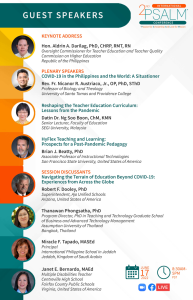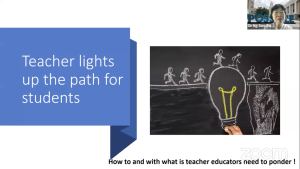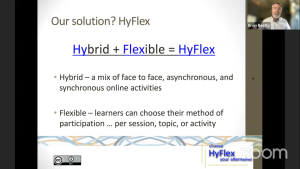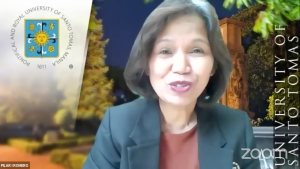The UST College of Education gathered around 200 educators worldwide in its 2nd International Passion for Scholarship And Love for Mission (PSALM) Conference on June 17, 2022, to discuss the impacts of the COVID-19 pandemic to educational delivery.




Anchored on the theme “Onward and Upward: Charting the Direction of Teacher Education During and Beyond COVID-19,” the event coincides with the 96th Founding Anniversary of the College, a Commission on Higher Education (CHED) Center of Excellence in Teacher Education.
College of Education Dean Prof. Pilar I. Romero, LPT, Ph.D., underscored the University’s mission to “form professionals who will become engaged practitioners of change, advocates for truth, justice, and charity, and not mere fodders for the industrial mill.”
UST is also one of the pioneer educational institutions in the country guided by the United Nations Sustainable Development Goals.
COVID-19 Situationers
Rev. Fr. Nicanor R. Austriaco, Jr., O.P., Ph.D., S.Th.D., disclosed that cumulative COVID-19 cases in the country was relatively moderate as compared with other countries.
The professor of Biology and Theology at the University of Santo Tomas and Providence College also encouraged vaccination and wearing of N95 masks to get maximum protection against Omicron’s BA.4 and BA.5 variants.
Meanwhile, SEGi University, Malaysia, Faculty of Education Senior Lecturer Datin Dr. Ng Soo Boon underscored that teachers, as instruments in education, need skills and reskilling training in remote learning. She also indicated the teachers’ need for technical help and policy support, echoing the keynote speech of Dr. Aldrin A. Darilag, Ph.D., CHED Oversight Commissioner for Teacher Education and Teacher Quality.
Dr. Brian J. Beatty, associate professor of Instructional Technologies at the San Francisco State University, USA, reintroduced HyFlex Teaching and Learning system as prospects for a post-pandemic pedagogy.
HyFlex, a blend of hybrid and flexible, lets students choose to attend class either in an assigned face-to-face environment or in an online environment (synchronous, asynchronous, and bichronous).
Dr. Beatty explained that HyFlex allows him to be more engaged with his students, because he was able to ask students which system works with them.
Education Beyond COVID-19
In his lecture, Dr. Robert F. Dooley, Ph.D., Superintendent of Ajo Unified Schools Arizona, USA, took notice that during the shutdown period, it was easier for families to withdraw from school.
Meanwhile, Dr. Thanawan Phongsatha, Ph.D., mentioned the Thai government program Distance Learning TV (DLTV), initiated by the late King Bhumibol Adulyadej in 1995, which gave schools in rural areas and the outskirts of their country a better opportunity through satellite TV.
“During COVID-19, DLTV has been great help to make sure that the school delivers the basic curriculum not only in the rural areas, but also in the cities,” she said.
Dr. Phongsatha is the Program Director of the Doctorate in Teaching and Technology program under the Graduate School of Business and Advanced Technology Management of the Assumption University of Thailand Bangkok, Thailand.
“We believe at the frontier of our virtual classes are our teachers,” attested Miracle F. Tapado, who oversaw the teacher trainings and curriculum evaluation, with the participation of parents, at the International Philippine School in Jeddah (IPSJ) in Kingdom of Saudi Arabia.
The principal of IPSJ said that, after the Kingdom lifted all the COVID-19 protocols, all students are back to the campus, but they are still using the learning management system.
Janet E. Bernardo, Multiple Disabilities Teacher at the Centreville High School, Fairfax County Public Schools Virginia, USA, related that they created a communication plan, with agenda notebooks, emailing system, and discussion boards.
Their schools have continued full time in-person learning, observation of health protocols, implementation of learning management system, and refinement of their technical skills.
With discussions on the latest empirical findings in teacher training, the International PSALM Conference is conducted not only to create a network of academics, but also inform policy and practice among teacher education institutions (TEIs).




